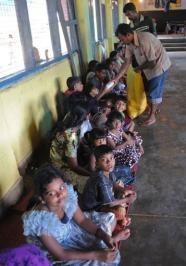 Sri Lanka’s minority Tamils would normally celebrate their annual harvest festival Saturday, but instead they are struggling to survive the worst flooding in living memory.
Sri Lanka’s minority Tamils would normally celebrate their annual harvest festival Saturday, but instead they are struggling to survive the worst flooding in living memory.
With a handful of rice and a couple of incense sticks, Sadairani Kumar is keen to mark the festival of Thaipongal, popular among the Hindu ethnic Tamil community who offer thanks to the sun god for a bountiful harvest.
But this year, floods have washed out crops, swamping agricultural land in the country’s rice-growing east and forcing hundreds of thousands from their homes — Kumar’s family among them — leaving them with little to celebrate.
"It’s almost like a curse, don’t you think?" Kumar, 47, told AFP as she arranged her meagre offerings on a plastic cup she will take to the Hindu temple opposite the welfare camp for flood-displaced people.
"First the war, then the tsunami, then the war, and now this. God has cursed us this year," she said, shaking her head.
Batticaloa saw heavy fighting between troops and Tamil Tiger rebels before security forces crushed the guerrillas in May 2009, ending a 37-year ethnic conflict.
It was also hit by the 2004 Asian tsunami that killed 31,000 in Sri Lanka, so like many of its residents, Kumar is no stranger to hardship.
She had already pawned her jewellery to raise cash to grow vegetables last year. When the rain arrived in December, she shrugged it off — but as rains became floods, the family fled with a few belongings piled onto their tractor.
A tree crashed into their house, while their belongings were lost to the muddy waters. Now they are among almost 400,000 people forced out of their homes.
"There is nothing else," her son 11-year-old son Neelan says. "My school books are gone. New uniforms, shoes, toys. We don’t have money to rebuild the house or pay our loans."
Over half a million people in the lagoon district of Batticaloa were affected by the rising water, which cut it off from the rest of the country for several days.
A similar number were hit by the floods in nearby Ampara and Polonnaruwa districts — which like Batticaloa are traditional rice harvesting regions — making a total of a million people victims of the deluge.
The Disaster Management Centre put the death toll at 27, and said that dozens of people in remote parts of the area were still marooned and unable to reach welfare centres.
Small boats crammed with flood victims on Friday struggled to help them to shelter, while the army flew in relief supplies on helicopters. In the town of Batticaloa, a lone truck struggled to navigate a normally busy street turned into a river.
"We have never faced a situation like this before," said K. Kandalingam, 34, who works as a casual labourer on building sites.
"Even in the war we could buy food if we had money. Today, even shops are rationing food because there are no supplies."
When sun briefly shone on Friday, residents braved the muddy waters to stock up on essentials. But key access roads were blocked, and those that were not quickly became impassable, prompting the army to step in and help.
Mamangewswaran area government official M. Mahendrarajah said people would have to sleep on cold cement floors in schools, churches and Hindu temples until state or donor assistance arrived.
"A lot of work needs to be done after the water goes down, but first we have to assist people in welfare centres, to make sure they get adequate food, medicines and clean drinking water," UNICEF spokesman Mervyn Fletcher said.
Businesses have also taken a beating and may drive people into more debt, complains Yogendran Rameshkumar, 24, a plastic goods salesman who lost his stock to the rising waters.
(For updates you can share with your friends, follow TNN on Facebook and Twitter )
